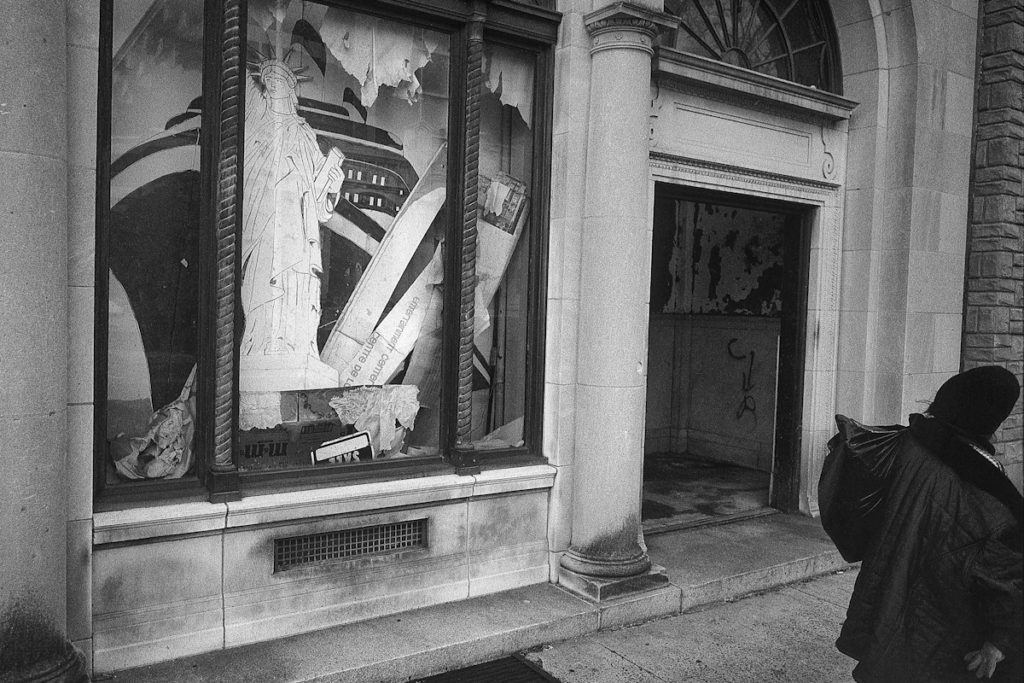“The beholder feels an irresistible urge to search a picture for the tiny spark of contingency, of the here and now, with which reality has seared the subject, to find the inconspicuous spot where in the immediacy of that long, forgotten moment the future nests so eloquently that we, looking back, may rediscover it.” Walter Benjamin, Little History of Photography.
I buy a coffee and chose a window seat with a view onto Main Street. The people who sit around me, young, affluent, seemingly well-educated, interact with their phones or, if past a certain age, read a book. An eclectic mish-mash of music – 50’s crooners to 70’s funk to hipster folk-rock – plays a bit too loud in the background. What little conversation I hear is the perfunctory dialogue of the service industries, trite blandishments that lubricate commercial interactions. The conviviality within the space sounds forced, an affectation, as if the patrons were being made to try out for a part.
He catches my eye because of the incongruous sight he presents amidst the casual abundance around him. At first glance I mistake him for a fisherman, the kind you occasionally see trying to catch a meal from the banks of some sad industrial culvert. He wears a grey hoodie, holds a pail in one hand and what looks to be a window washer’s pole in the other. He moves as if through a medium slightly more viscous than he expected, a mix of hesitancy, resignation and muted expectation. He crosses Main Street, traverses the public art installation plaza and stops in front of the gourmet cupcake store, where he puts down his pail and props his window washer’s pole against the storefront facade. As he opens the store door the woman who works the counter approaches him. They meet halfway between the door and the counter. They speak briefly, and then he turns and leaves, retrieves his pail and pole, turns the corner and walks away out of my line of sight.
One hundred years ago, Booker T. Washington and WEB DuBois hailed this town as a model of progressive black society. Known as “Black Wall Street,” Parish Street, just around the corner, housed the nation’s largest black-owned insurance company and numerous banks offering home mortgages and small business loans to local blacks. Since then, the black “middle class” has either moved up and on or migrated downward to more prosaic neighborhoods, where you can buy drugs or the cheap services of a woman without having to walk very far. Just a few years ago, before the gentrification, downtown was deserted save for a few homeless folks. Storefronts were boarded up or empty. I remember walking there with my Leica, feeling self-important, searching for a trophy to take home. I’m reminded now of a picture I took then – the image of a defeated looking woman dragging her bag of possessions past a faded cardboard Statute of Liberty displayed in an abandoned store window.
Walking the same street last week, I encountered a group of well-dressed folks in front of the old Kress Building on Main Street, one of the latest in a series of downtown renewal projects, now high-income lofts catering to urban professionals. The people wore name tags and appeared to be part of a guided downtown tour hosted by a prominent local university. I recognized one of the group’s guides as a well–regarded academician I’d previously seen on public television. She seemed enthused about downtown’s revitalization and pleased with the role she might be playing. I heard snippets of talk among the assembled, words and phrases that sounded vaguely anthropological, and then talk of catching lunch at a place next to the gourmet cupcake store, a new restaurant that serves local craft beers and wood-fire baked artisanal pizzas.
In some strange sense, I felt vindicated that I took that photo all those years ago. It’s evidence of what we’d otherwise forget. What would these people have to say to that haggard woman dragging her bag past the faded cardboard cutout? Would they even care that she had lived here, that it was home to her, and she had since probably moved elsewhere to accommodate them? No one is denying her a place to call home, certainly not these good people helping revitalize a moribund downtown.
The waitress presents me my check with unwelcomed gregariousness. My ‘Mexican Coffee’ will set me back 5 dollars with tip. Some earnest alt-rock group plays a tone-deaf version of John Lee Hooker’s “Catfish Blues” in the background, sacred music profaned by the well-meaning. As I exit the cafe, an elderly black woman, clutching a bag of donuts, moves quickly past the cafe window, eyes averted, as if this storefront hides some toxic secret.
Views: 696


wonderfull story… love it!
You have a wonderful way with words the picture is superb made even better by your framing.
This narrative is being played out throughout the westernised world, and like you I suspect there are many lives that had been there and have gone taking with them the memories garnered from a life forgotten.
At least your image and no doubt others out there unseen document these moments.
I was riding along an old roman road in the middle of nowhere when I had those very thoughts about who’d travelled this route and moreover what they had left behind whilst doing so.
You should be writing novels.
This is the kind of story which makes your site invaluable, way above most of the photo blogs.